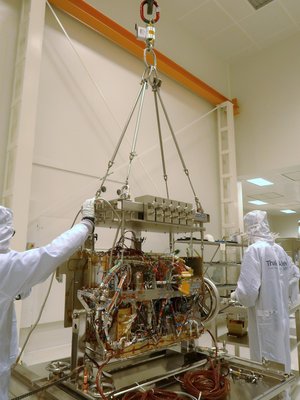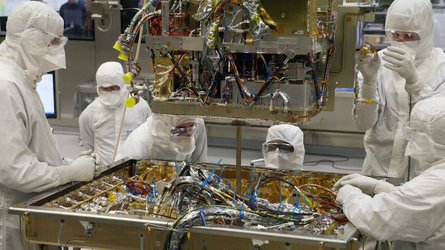Accept all cookies Accept only essential cookies See our Cookie Notice

About ESA
The European Space Agency (ESA) is Europe’s gateway to space. Its mission is to shape the development of Europe’s space capability and ensure that investment in space continues to deliver benefits to the citizens of Europe and the world.
Highlights
ESA - United space in Europe
This is ESA ESA facts Member States & Cooperating States Funding Director General Top management For Member State Delegations European vision European Space Policy ESA & EU Space Councils Responsibility & Sustainability Annual Report Calendar of meetings Corporate newsEstablishments & sites
ESA Headquarters ESA ESTEC ESA ESOC ESA ESRIN ESA EAC ESA ESAC Europe's Spaceport ESA ESEC ESA ECSAT Brussels Office Washington OfficeWorking with ESA
Business with ESA ESA Commercialisation Gateway Law at ESA Careers Cyber resilience at ESA IT at ESA Newsroom Partnerships Merchandising Licence Education Open Space Innovation Platform Integrity and Reporting Administrative Tribunal Health and SafetyMore about ESA
History ESA Historical Archives Exhibitions Publications Art & Culture ESA Merchandise Kids Diversity ESA Brand Centre ESA ChampionsLatest
Space in Member States
Find out more about space activities in our 23 Member States, and understand how ESA works together with their national agencies, institutions and organisations.
Science & Exploration
Exploring our Solar System and unlocking the secrets of the Universe
Go to topicAstronauts
Missions
Juice Euclid Webb Solar Orbiter BepiColombo Gaia ExoMars Cheops Exoplanet missions More missionsActivities
International Space Station Orion service module Gateway Concordia Caves & Pangaea BenefitsLatest
Space Safety
Protecting life and infrastructure on Earth and in orbit
Go to topicAsteroids
Asteroids and Planetary Defence Asteroid danger explained Flyeye telescope: asteroid detection Hera mission: asteroid deflection Near-Earth Object Coordination CentreSpace junk
About space debris Space debris by the numbers Space Environment Report In space refuelling, refurbishing and removingSafety from space
Clean Space ecodesign Zero Debris Technologies Space for Earth Supporting Sustainable DevelopmentLatest
Applications
Using space to benefit citizens and meet future challenges on Earth
Go to topicObserving the Earth
Observing the Earth Future EO Copernicus Meteorology Space for our climate Satellite missionsCommercialisation
ESA Commercialisation Gateway Open Space Innovation Platform Business Incubation ESA Space SolutionsLatest
Enabling & Support
Making space accessible and developing the technologies for the future
Go to topicBuilding missions
Space Engineering and Technology Test centre Laboratories Concurrent Design Facility Preparing for the future Shaping the Future Discovery and Preparation Advanced Concepts TeamSpace transportation
Space Transportation Ariane Vega Space Rider Future space transportation Boost! Europe's Spaceport Launches from Europe's Spaceport from 2012Latest

ExoMars Analytical Laboratory Drawer
Thank you for liking
You have already liked this page, you can only like it once!
A key set of scientific instruments developed for the ExoMars rover Rosalind Franklin passed tests April 2019 to ensure compatibility with the martian environment.
The rover’s Analytical Laboratory Drawer (ALD) flight model completed its thermal and vacuum sessions in Turin, Italy, at a Thales Alenia Space Italy facility.
The ExoMars rover ALD system is designed by Thales Alenia Space Italy in Turin and carries a set of four complex mechanisms developed by OHB in Munich, Germany, that can process and supply soil samples to three scientific instruments. Dedicated control electronics and a thermal control system will keep the system working and operating at the required temperatures while preserving the Mars samples and possible traces of organic molecules.
The instruments will make a detailed study of the composition and chemistry of the soil samples collected by the Rover’s drill. Following a process similar to a factory floor, once acquired from the drill, samples are dropped into a crushing station and pulverised. The fine powder is then dosed and moved on to the next area for precise distribution – either on a refillable container or in thumb-sized ovens where the specimens are analysed.
The Analytical Laboratory Drawer houses three instruments to search for signs of life on Mars.
The ‘MicrOmega’ instrument uses visible and infrared light to characterise minerals in the samples; a Raman spectrometer uses a laser to identify mineralogical composition and lastly a combination of a Laser Desorption Mass Spectrometer and of a Gas Chromatograph (part of the “MOMA” instrument) will study and identify soil chemistry. The most scientifically interesting samples, will be dosed into the MOMA ovens. The ALD has 31 ovens, where samples can be heated and the vapour and gases emitted will be analysed with gas chromatography techniques to look for traces of organic compounds.
-
CREDIT
Thales Alenia Space -
LICENCE
ESA Standard Licence

Moving the ExoMars Analytical Laboratory Drawer

Rover laboratory inside test chamber

ExoMars rover comes out of the ‘oven’

ExoMars rover model testing science mode















 Germany
Germany
 Austria
Austria
 Belgium
Belgium
 Denmark
Denmark
 Spain
Spain
 Estonia
Estonia
 Finland
Finland
 France
France
 Greece
Greece
 Hungary
Hungary
 Ireland
Ireland
 Italy
Italy
 Luxembourg
Luxembourg
 Norway
Norway
 The Netherlands
The Netherlands
 Poland
Poland
 Portugal
Portugal
 Czechia
Czechia
 Romania
Romania
 United Kingdom
United Kingdom
 Slovenia
Slovenia
 Sweden
Sweden
 Switzerland
Switzerland

























